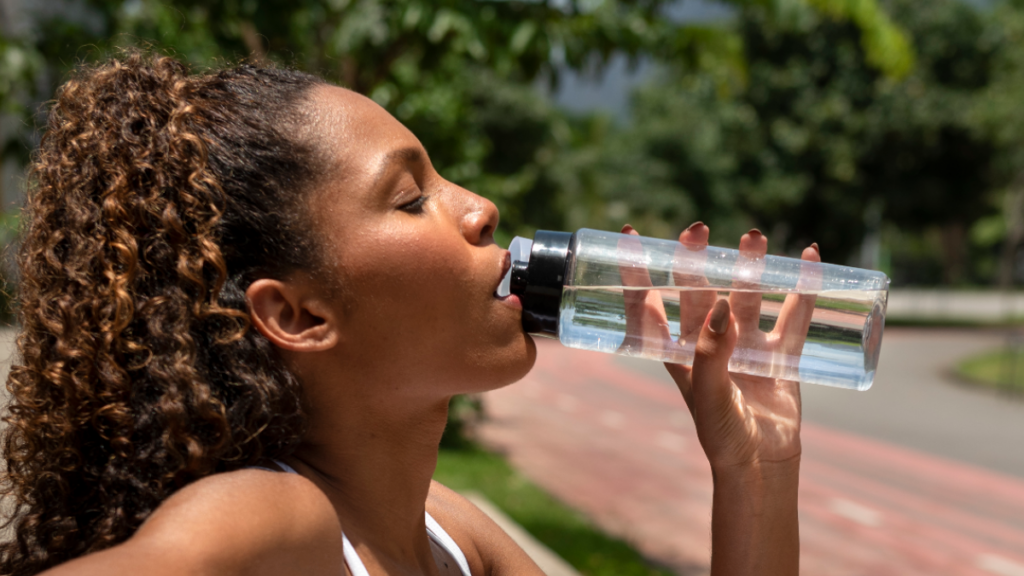As temperatures continue to rise and the sun blazes during summer runs, staying hydrated is one of the most critical challenges for runners during these months. Dehydration is a serious risk that hinders performance and can cause health complications.
“In my years of experience, youth runners often wait until they are thirsty to hydrate, at which point, they are already up against the effects of dehydration, which can include declines in both endurance and cognitive performance,” said registered dietitian, Kelly Jones.
Whether heading out for a casual jog, or training for the upcoming fall season, understanding how to maintain optimal hydration is essential for safety and summer running success.
The following are expert-backed tips to help runners stay on top of hydration needs.
Start The Day Off With Water
“Runners should start their day with water when they wake up, to help stay on top of their fluid needs,” Jones said.
Keep a large glass of water on your nightstand as a reminder to drink upon waking up. This can help create the habit. Athletes can also use an app to be altered with reminders to hydrate throughout the day.
Eat Carbs
Consuming a healthy diet is important for runners, including eating enough carbohydrates to fuel the body during workouts.
“It’s also helpful to include fluid and carbohydrates at all meals and snacks to maintain hydration while supplying necessary energy,” Jones, RD said. “Glycogen, the stored form of carbohydrate in the muscles, is the preferred source of energy for moderate to high-intensity exercise. For each gram of carbohydrate stored as glycogen, almost 3 milliliters of water are also stored, helping start an activity on the right foot. In the summer heat, youth runners may require more of both, so adding a four oz glass of 100 percent orange juice to meals, whether before or after runs, may help meet both their fluid and carbohydrate goals.”
Jones revealed that many youth athletes under-consume carbohydrates – often due to busy schedules or misconceptions about their role in supporting active lifestyles.
“Carbohydrates are the preferred energy source for exercising muscles and also aid in supporting hydration, so runners need to prioritize them to perform at their best.”
Watch For Signs Of Sodium Loss
Athletes can lose between 0.5 – 2 liters of sweat per hour, with sodium losses between 200-2,000 mg per liter, Jones said. It’s important to watch out for increased sweat and thus sodium loss to prevent health issues.
“Those who sweat heavily—often noticeable by a sand-like texture on their skin after exercise, the taste of salt while sweating, or salt lines on their clothes after a run –—may need to be especially mindful of replacing sodium,” Jones said.
For runs lasting longer than 30 minutes, youth runners should plan to consume water throughout the workout to rehydrate.
Add Additional Beverages
Longer runs require more than just H2O for hydration. This is where sports drinks or electrolytes-based powders come in.
“For runs lasting 60 minutes or longer, aim for between 13-27 ounces of fluid along with both carbohydrates and sodium,” Jones said. “The carbohydrates help supply additional energy for working muscles while maintaining blood sugar as glycogen depletes, while the sodium replaces losses and aids the carbohydrates in maintaining fluid balance.”
Those who don’t like sports drinks can also reach for orange juice for rehydration needs.
A clinical study found that drinking orange juice following exercise contributed to hydration equally as well as water or a sports drink, making 100% orange juice a viable and healthy option as a post-exercise beverage.
Runners can check out Florida OJ Sports Drink, which is composed of mostly water. It also provides adequate carbohydrates, along with vitamin C, potassium, and other beneficial nutrients, making it a viable alternative to sports drinks.
Jones said to add anywhere from a pinch up to a 1/4 teaspoon of salt in the beverage depending on personal sweat sodium losses for those hot runs.

